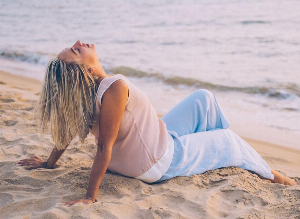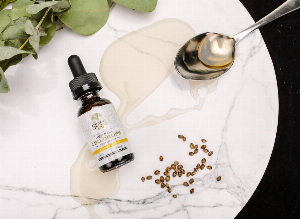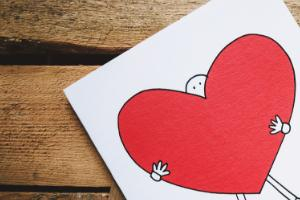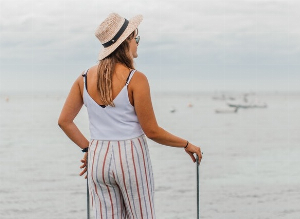Ankylosing spondylitis: "I'll never stop being active in spreading the word about this disease!"
Published 16 Nov 2017 • By Léa Blaszczynski
Karine, a member of Carenity France, has ankylosing spondylitis. She is determined to never stop raising awareness of AS, so that others living with the disease know that they are not alone.
Discover her story below!

Hello Karine, thank you for agreeing to share your story with us on Carenity.
Could you introduce yourself in a few words?
Hi Léa, I am 41 years old and I live in a couple in the north of France, in Maubeuge, 30 minutes from Valenciennes. We have a 10 year old son and I have been working in administration for 19 years.
How did you learn that you had ankylosing spondylitis and after how long?
I had been seeing my rheumatologist regularly for herniated discs for 10 years, or so I thought. In September 2015, the pain became unbearable. I made an appointment with my rheumatologist, I simply told him that I was in pain all the time, feeling like my muscles were going to "burst". At night it was hell, I couldn't sleep.
My rheumatologist scheduled me for genetic tests looking for the HLA B27 gene and for an MRI and warned me that I may have a problem with my sacroiliac joints.
When I got out of the MRI, I was told straight away that I had ankylosing spondylitis. Suffice it to say that I wasn't too happy about it. A few days later, the lab sent me the positive result for HLA B27.
I went online and discovered the Carenity website. I signed up without hesitation.
Did you know anything about AS?
No, I didn't know anything about this disease, I felt lost. It struck me that many people were suffering and that I was not the only one. That's why I wanted to spread the word about this disease, I started by creating a small blog (in French), and then I asked for it to be featured on Carenity.
At the same time, I discovered Coralie Caulier's story and her music video, "Grand Patiente" ("Big Patient"). Her video touched me and it motivated me even more to continue. I reached out to her on Facebook, she kindly responded to me. Since my diagnosis I've felt the need to make this disease known, so I've joined Coralie in her fight.
The public has the right to know, to be able to understand this invisible, insidious and capricious disease. I think that this can help many people. This initiative is particularly close to my heart and I will never stop being active in spreading the word about AS.
How have you handled the first few months with AS?
Honestly, not very well. I still haven't accepted the diagnosis and I've decided to see a psychologist. I don't think it's a good idea to wait for it to pass and there's no shame in asking for help.
My fear is for my son, does he carry the gene? I have been advised not to have him tested yet, there will still be time once he is an adult.
Physically, it depends on the day, yesterday I had a lot of pain, today much less. I'm taking cortisone and an anti-inflammatory (the 3rd in 3 months).
How did your family and friends react?
My husband, who was present on the day of the "official" diagnosis at the rheumatologist's, has always supported me despite my feeling like he didn't quite understand what I was feeling. The fact that he heard it himself, he understood immediately that it was not a minor problem and tried to help me as much as he could.
My son, despite his young age, also understood, I didn't hide it from him, while trying to downplay it as much as possible. My son asked me to say that it is hard for him, he "doesn't have the same mother anymore".
The rest of my family, my few but very present friends and my closest colleagues try to understand in their own way and check in regularly.
It's not easy to understand when you can't feel the pain.
You will soon be starting biotherapy. Are you confident in this line of treatment?
I wouldn't say confident, but let's just say that I have great hopes for biotherapy. I think most people are coping with it quite well, and some are even experiencing a sort of "rebirth".
I hope that this long-term treatment will allow me to return to a normal life with activities with my husband and my son. At the moment I can't take much walking and driving.
How does participating in a patient community help you in the day-to-day?
Carenity helps me in my daily life, because I can meet people who understand me instantly, benefit from their advice and give my advice in turn. And we can communicate in complete security.
I log on every day, I regularly update my dashboard and my treatments. Over time, I have a sort of record of everything automatically and I think that this is a real advantage that Carenity offers us, because we rarely take the time to note everything ourselves.
The surveys that are offered to us are made to advance research, so I advise each patient to take some time to participate in these surveys.
Do you have any advice to share with other members affected by AS?
I would tell them not to stay alone in their pain, talk about it with others. Your family generally can't take the place of other patients, who understand more easily. And don't hesitate to ask for help from your medical team if you feel the need. Keep working if possible.
I'd also recommend keeping your dashboard and your treatments updated on here. You'll see from one month to the next, you can already see how your condition is evolving, whether it is in a positive or negative direction.
Is there anything else you'd like to share?
Always keep smiling :) Communicate, be open to others.
I would like to thank Carenity for this interview as well as my husband, my son, my family, my friends and close colleagues and Coralie Caulier who motivated me even more to fight.
Many thanks to Karine for sharing her story on Carenity!
Was this testimonial helpful to you?
Share your thoughts and questions with the community in the comments below!
Take care!

 Facebook
Facebook Twitter
Twitter


